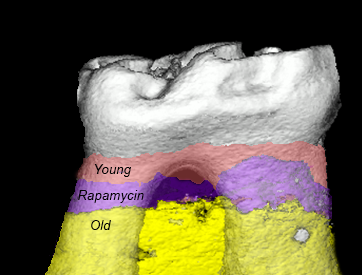Work from HALO Director Matt Kaeberlein and HALO Faculty Jonathan An published in the journal eLife reports on the first therapy ever found to reverse clinical features of periodontal disease, at least in mice. Periodontal disease is one of the most prevalent age-associated diseases, afflicting approximately 2/3 of elderly people. Those who suffer from periodontal disease are at higher risk of other age-related diseases including diabetes, heart disease and dementia.
In the new study, Drs. An and Kaeberlein showed that aging laboratory mice naturally develop periodontal disease, including clinically defining features of the disease such as loss of periodontal bone around the teeth, chronic inflammation of the gums, and dysregulation of the oral microbiome. Amazingly, 8 weeks of treatment with the drug rapamycin was sufficient to reverse all three of these disease symptoms in old mice.
Going forward Drs. An and Kaeberlein plan to further characterize the mechanisms at play and to determine whether the oral rejuvenating properties of rapamycin can be achieved by local delivery of the drug within the oral cavity. Dr. Kaeberlein hopes that this work will rapidly lead to clinical testing in people, as there are currently no effective therapies for reversing periodontal disease available.
See the eLife press release here: Immune-regulating drug improves gum disease in mice
Full text of the primary research article here: Rapamycin rejuvenates oral health in aging mice
